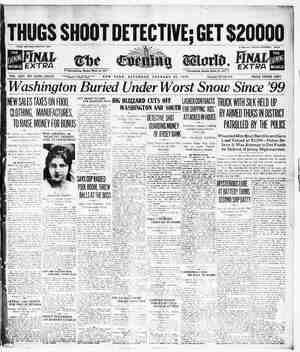The evening world. Newspaper, January 28, 1922, Page 17
You have reached the hourly page view limit. Unlock higher limit to our entire archive!
Subscribers enjoy higher page view limit, downloads, and exclusive features.
THREE SECTIONS SATURDAY, JANUARY 28, 1922. SECTION TWO. THE: MEN OF, ZANZIBAR —. By RICHARD HARDING DAVIS: Illustrated by WILL B. JOHNSTONE *® Characters in. the Story Hemingway, a hunter of big game. ~ Harris, the American Consul. —. Lady Firth, wife of the?’ British Agent. ¢ » HEN his hunting trip in Uganda was over, Heming- way shipped his specimens and weapons direct from Mombasa to New York, but he him- self journeyed south over the few miles that stretched to Zanzibar. - On the morning he arrived he had called wpon Harris, his Consul, to in- quire about the hotel; and that even- ing Harris had returned his call and introduced him at the club, One of the men there asked Hem- ingway what brought him to Africa, and when he answered simply and truthfully that he had come to shoot big game, it was as though he had said something clever, and every one smiled. On the way back to the hotel, as they felt their way through the narrow slits in the wall that served as streets, he asked the Consul why every one had smiled, The Consul laughed evasively. “It's a local joke,” he explained. “A lot of men come here for reasons best kept to themselves, and they all say What you said, that they’ve come to shoot big game. It’s grown to be a polite way of telling a man it is none of his business.” “But I didn’t mean it that way," pro- ested have been after big game for the last eight Hemingway. ‘IT really months.” In the child, the Consul answered soothingly. tone one uses to quiet a “Or course,” he assented—"“of course you have.” But to keep involving himself “Maybe they noticed Hemingway from deeper he hinted tactfully: you came ashore with only one steamer trunk and no gun cases,” “Oh, that’s easily explained,” laughed Hemingway. “My heavy luggage’—— The Consu] had reached his haquse. “Please don't explain to me,” he begged, “It’s quite unnecessary. Down here we're so darned glad to see any white man that we don’t ask anything of him except that he won't hurry away.” “All right!” Hemingway exclaimed. “I'll promise not to bore you with my past, and I agree to be judged by Zan- vibar standards,” Hemingway kept his promise. Of his past he made a point never to speak. Of the fact that a college was named after his grandfather and that on his father’s railroad he could travel through many States, he was dis- ereetly silent, HE of Zanzibar asked nv questions. That Hemingway could play a stiff game of ten- a stiffer game of poker, and, on the piano, songs from home men nis, was to them sufficient recommenda- tion. In a week he had become one of the most popular members of Zanzi bar society, Hemingway found himself reaching out to grasp the warmth of the place as a flowe1 turns to the sun He found it like being perpetually in a comic opera and playing a part in one. For only the scenic artist paint and would dare to such yellow, “pro- ducer’ would have conceived costumes and so Instinc- tively he cast-the people of Zanzibar in the conventional roles of musical cont yy. pity houses in pink, cobalt-blue; only a so mad magnificent. LOVE, MYSTERY, SURPRISES His choruses were already in waii- ing. There was the Sultan's body- guard in gold-laced turbans, the mer- chants of the bazaars in eed fezzes and gowns of flowing silk, the Malay sail- ors in blue, the black native police in . scarlet, the ladies of the harems closely veiled and cloaked, the market women in a single garment of orange, or scar- let, or purple, or of all three, and the happy, hilarious Zanzibari boys in the color God gave them. His comic opera lacked only a hero ine and the love interest. When he both. dared to do so preferred to call like himself, an American and, though absurdly young, a widow. _In the States she would have been called an extremely pretty girl. In a commu- nity where the few dozen white women had wilted and faded in the flerce sun of the equator, and where the rest of black except their teeth, which were dyed an allur- ing purple, Polly Adair was as beau- tiful as a June morning. At least, Mrs. Adair he Polly Adair, as every one who met found her, was, the women were jet “1 SAW MRS. ADAIR CREEP OUT OF FEARING'S HOUSE, SAW HIM WALK WITH HER WO THE @ATE, SAW HiM IN THE SHADOW OF HE BUSHES TAKE WP IN HIS ARMS, AND SAW THM KISS, sa - ® ‘ Characters in the Story “Polly” Adair, an Ameri- can widow, a typist. Arthur Fearing, Ameri- can, a hermit. George S. Sheyer, Pinker- ton agent. so Hemingway thought. He met her, three days after his are rival, at the residence of the British Agent and Consul General, where Lady Firth was giving tea to the six nurses from the English hospital and to all the other respectable members of Zan- zibar society, “My typist,” said ladyship as she helped Heming husband's her way to tea, “is a compatriot of yours, She's such a nice gell; not a bit like an American, I don’t know what I'a do in this awful place without her Prom. iff HTH roe paid *







